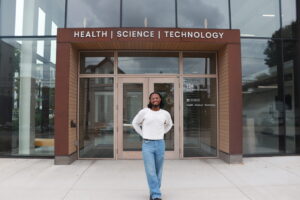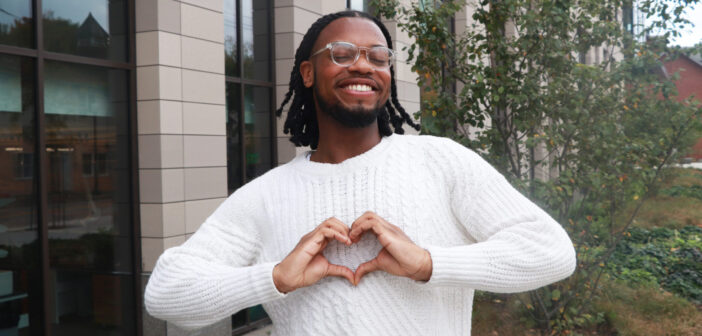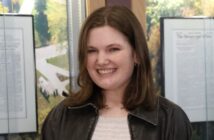Soft R&B music floats through the speakers of the Business Innovation Building, specifically Room 118, as Kareem Hargrove, ‘25, circles the room in his white Converse and baggy jeans.
While humming along to the song, he greets each person who enters through the propped-open door by name with a big smile.
Nearly 15 minutes have passed since the beginning of the first Black Student Union meeting of the fall semester.
Hargrove steps to the microphone at the front of the space. He taps twice, he laughs, and bends the microphone arm away from his face, deciding it creates an unnecessary disconnect between him and the 35-person group.
He makes his introductory remarks, cracks a joke and is met with enthusiastic applause.
The simple act symbolizes how Hargrove approaches everything he does at Lehigh: on a personal level.
“I think growing up, being social was really hard for me,” Hargrove said. “So more recently, I’ve started to grow into myself, and I think the reason I am so personal is because I sort of want to be the person that I wish I had — where I might have been the only person sitting alone in a room wishing someone would come up to speak to me.”
As president of the Black Student Union and the Student Senate Bethlehem outreach committee chair, Hargrove is committed to actualizing his goal of connecting minority groups with helpful resources.
To do this, he hopes to pave the way for more leaders of color on campus. And through his personable traits, he wants to one day make United States healthcare more equitable.
For Hargrove, it starts with connecting more students — particularly students from Black, Indigenous and communities including people of color — with academic and extracurricular opportunities. He said he feels Lehigh offers a variety of programs, but people often don’t know how to find them or they feel unequipped to apply.
Hargrove’s interest in health equity drew him to the College of Health, where he is a first-generation student majoring in population health with minors in biostatistics and economics.
He grew up in Stamford, Connecticut, surrounded by the healthcare community. His mom worked as an in-house aide for people facing health difficulties and his grandmother was plagued with chronic illnesses.
“It made me really interested in the field but also made it tangible for me,” Hargrove said. “It wasn’t something that I was studying. It was something I was living.”
Hargrove wants to help spread information to marginalized communities and ensure they’re comfortable with healthcare providers. He said he feels his interest in health equity bleeds into his involvement on campus, particularly in the Black Student Union and Student Senate, because research has shown that togetherness has a significant impact on health.
The Black Student Union, Hargrove said, fosters a space for Black people to be together but also is a place for people to learn about different identities. He became involved during his first year at Lehigh as the social media manager and worked his way up to president.
Risa Nkululeko, ‘25, vice president of the union, said Hargrove is vital to the organization because of how active he is on campus.
“All of his involvement is able to serve as a resource to other students who also want to be involved,” Nkululeko said. “Especially in our community, it’s difficult to reach out sometimes, and it’s difficult to find that support. When you have someone like (Hargrove) who is already in all these different avenues and is more than willing to talk about it, (it) makes the transition incredibly easier.”
Hargrove watched the Black Student Union grow out of the pandemic and with the increasing Black population on campus and in the Bethlehem community.

Kareem Hargrove, ‘25, poses outside of the Health, Science and Technology building on Oct. 6. Hargrove is the president of the Black Student Union and is Bethlehem outreach commitee chair for Student Senate. (Julia Contino/ B&W Staff)
According to Data USA, 4.27% of the Lehigh student body was Black in 2021, compared to 5% in 2023, as reported by the University Statistics. In Bethlehem, 8.15% of the community included Black individuals in 2020, while it was reported to be 9.3% in 2022, according to the U.S. Census.
One of Hargrove’s goals is to emphasize to the union members the importance of hosting activities in the South Side community, such as collaborating with local, community-based organizations, because there is a prominent minority population.
This aligns with his chair position in the Senate as the liaison between the South Side community and the university. Hargrove joined the Senate last year and was placed on the outreach committee.
Kate Lyden, ‘24, Student Senate’s vice president of leadership, said she knew Hargrove was the right person for the job shortly after meeting him.
“I can tell how much he loves being part of the South Bethlehem community and how much he cares about making a difference not just on Lehigh’s campus, but within the local community as well,” Lyden said. “I feel like you can just see that from any interaction you have with (him), not just his work on the committee.”
Hargrove attends local town hall meetings and speaks with community members one on one.
He said an important part of his position is to know what the people on the South Side need from their relationship with Lehigh and ensure those needs are advocated for on campus.
Denise Beautreau, director of the Center for Student Access and Success, said this intentionality is what makes Hargrove stand out as a leader on campus. She said she has watched Hargrove take his passion and make it impactful to others.
“If you look at all the opportunities he’s done for study abroad, internships and research, they have all been intentional,” Beautreau said. “He sees value in engaging in those opportunities that lend themselves well to where he would like to be in the future and also the impact he would like to have on the local, regional and international community.”
She said there is never a time when Hargrove is not sharing his wisdom or not trying to get others involved on campus, especially within the center.
Along with encouraging new opportunities for others, Nkululeko said Hargrove is always trying new things. He became part of the Bad Company Dance Team last year and was accepted into Tumbao this semester in an attempt to explore his creative dance side.
Despite his packed schedule, Hargrove said he’s not tired because it doesn’t feel like work to him. He has made friends in all of his involvements and only invests his time into things he genuinely has a passion for, he said.
Nkululeko said Hargrove is equally dedicated to his relationships as he is to his campus work.
She said Hargrove recently spent two hours helping her practice to audition for Bad Company. She was nervous and couldn’t stop thinking about how other people would perceive her.
Hargrove assured her she was capable.
“Even though I know he’s very busy with all the other things to do, he sat there and was so patient with me and gave me grace,” Nkululeko said. “Little things like that really go a long way for me. All he does is put himself forward for other people.”
As for the future, Hargrove intends to stay involved and continue making a positive impact wherever he ends up.
He plans to attend graduate school to study how to use data, science and information to transform the state of healthcare in the United States, as he wants the country to be more equipped to treat the conditions and concerns of marginalized communities.
“Some people…walk into a space and the light just follows,” Beautreau said. “That’s what happens every time (Hargrove) comes here, anytime I see him walking across campus or at an event. It doesn’t matter what’s going on, there’s just that light that follows. That’s something special.”






Comment policy
Comments posted to The Brown and White website are reviewed by a moderator before being approved. Incendiary speech or harassing language, including comments targeted at individuals, may be deemed unacceptable and not published. Spam and other soliciting will also be declined.
The Brown and White also reserves the right to not publish entirely anonymous comments.